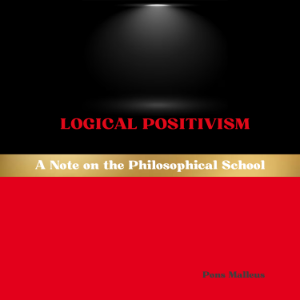

Logical Positivism: A Note on the Philosophical School
Pons Malleus
This audiobook is narrated by a digital voice.
This audiobook is an exploration of one of the most influential—and, in many respects, controversial—philosophical movements of the 20th century: logical positivism. Emerging in the intellectually vibrant but politically fractured climate of interwar Europe, logical positivism sought to establish a new foundation for philosophy—one rooted in logic, empirical science, and linguistic clarity. It was a radical call to arms against metaphysics, mysticism, and what its proponents saw as the obscurities and excesses of traditional philosophical discourse.
The core idea of logical positivism, also known as logical empiricism, was deceptively simple: only statements verifiable through empirical observation or logical proof are cognitively meaningful. All other statements, particularly those about metaphysical entities or ethical absolutes, were to be dismissed as meaningless—not necessarily false, but lacking the kind of sense that makes a claim genuinely discussable. This idea, often referred to as the "verification principle," formed the centerpiece of the movement and would shape debates in philosophy of language, science, and epistemology for decades.
Logical positivism was not a monolith, however. Its development involved a diverse group of thinkers—chief among them members of the Vienna Circle, such as Moritz Schlick, Rudolf Carnap, Otto Neurath, and later A.J. Ayer in the Anglo-American world—each with distinct contributions and evolving positions. What united them was a shared commitment to clarity, precision, and the belief that philosophy should be continuous with the sciences, not isolated from them. In this sense, logical positivism represented both a philosophical and cultural project: the attempt to bring reason, logic, and scientific method into a world increasingly dominated by ideology, superstition, and social upheaval.
Duration - 2h 56m.
Author - Pons Malleus.
Narrator - Digital Voice Alistair G.
Published Date - Thursday, 16 January 2025.
Copyright - © 2025 Pons Malleus ©.
Location:
United States
Networks:
Pons Malleus
Digital Voice Alistair G
Western Philosophical Schools
English Audiobooks
Findaway Audiobooks
Description:
This audiobook is narrated by a digital voice. This audiobook is an exploration of one of the most influential—and, in many respects, controversial—philosophical movements of the 20th century: logical positivism. Emerging in the intellectually vibrant but politically fractured climate of interwar Europe, logical positivism sought to establish a new foundation for philosophy—one rooted in logic, empirical science, and linguistic clarity. It was a radical call to arms against metaphysics, mysticism, and what its proponents saw as the obscurities and excesses of traditional philosophical discourse. The core idea of logical positivism, also known as logical empiricism, was deceptively simple: only statements verifiable through empirical observation or logical proof are cognitively meaningful. All other statements, particularly those about metaphysical entities or ethical absolutes, were to be dismissed as meaningless—not necessarily false, but lacking the kind of sense that makes a claim genuinely discussable. This idea, often referred to as the "verification principle," formed the centerpiece of the movement and would shape debates in philosophy of language, science, and epistemology for decades. Logical positivism was not a monolith, however. Its development involved a diverse group of thinkers—chief among them members of the Vienna Circle, such as Moritz Schlick, Rudolf Carnap, Otto Neurath, and later A.J. Ayer in the Anglo-American world—each with distinct contributions and evolving positions. What united them was a shared commitment to clarity, precision, and the belief that philosophy should be continuous with the sciences, not isolated from them. In this sense, logical positivism represented both a philosophical and cultural project: the attempt to bring reason, logic, and scientific method into a world increasingly dominated by ideology, superstition, and social upheaval. Duration - 2h 56m. Author - Pons Malleus. Narrator - Digital Voice Alistair G. Published Date - Thursday, 16 January 2025. Copyright - © 2025 Pons Malleus ©.
Language:
English
LOGICAL POSITIVISM
Duration:00:00:10
Introduction to Logical Positivism
Duration:00:19:15
Historical Context and Foundations
Duration:00:21:50
Key Concepts and Principles
Duration:00:16:55
The Verification Principle and Its Implications
Duration:00:21:09
Key Thinkers - Carnap, Schlick, and Ayer
Duration:00:20:53
Major Theories within Logical Positivism
Duration:00:17:27
Critical Assessments and Limitations
Duration:00:19:41
Responses from Other Philosophical Schools
Duration:00:18:20
Influence on Modern Philosophy
Duration:00:21:05